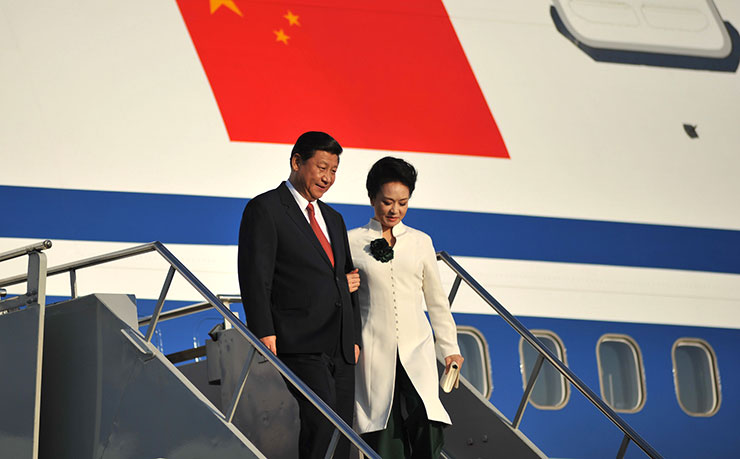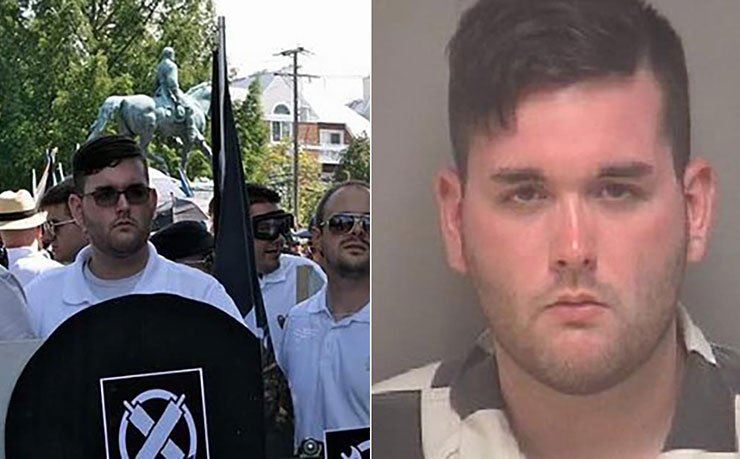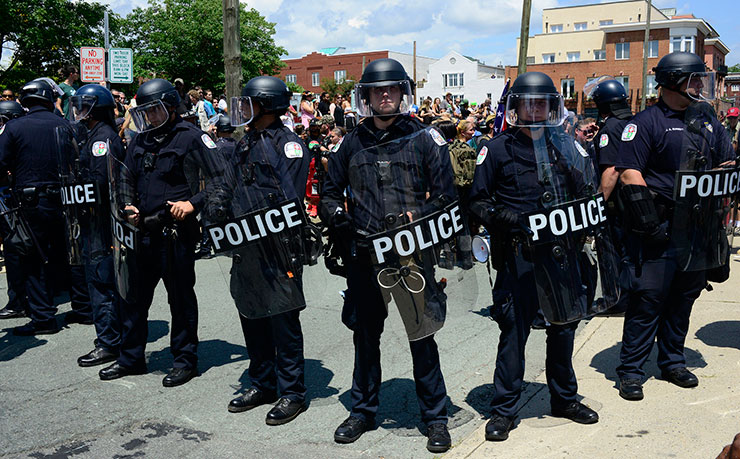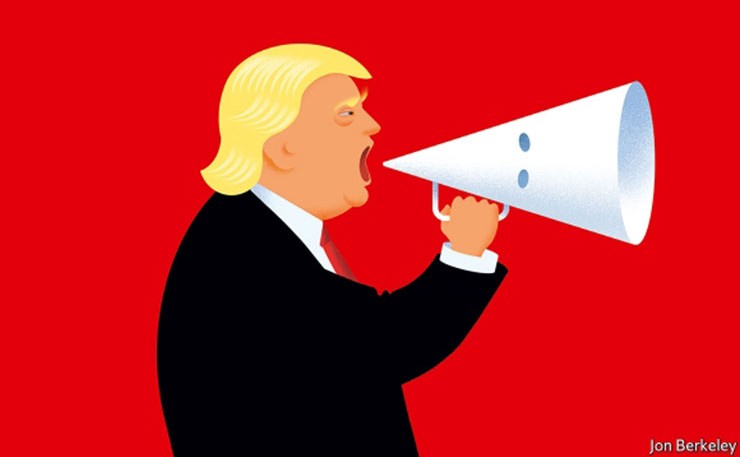The United States president has cruelled any chance of winning friends, influencing people and ‘Making America Great Again’. So how does a great nation recover and what comes next, wonders Stephen Scher.
The narrative describing Donald Trump’s his first half year as president is well known and, except among his strong supporters, a matter of consensus.
Though perhaps not intentionally, Trump has done everything in his power to make America weak. He has embraced isolationism and, in general, policies that proved to be self-destructive for the nation, both domestically and internationally.
There is no longer any question as to Trump possibly growing into his role as president. He has not, and presumably will not. And his decisions and policies have already worked to alter America and to alter, and potentially undercut, the relatively stable geopolitical arrangements that have structured international politics since the end of World War II.
The question, instead, is what this newly structured world order is going to look like. Most prominently, Trump’s isolationism has effectively invited China to inaugurate the Chinese Century, much earlier and with much less competition than expected.
Both economically (via its trillion dollar One Belt, One Road project;) and politically (by moving to take a leadership role regarding climate change), China has been losing no time.

The European Union is also rethinking its international posture in the wake of Trump’s isolationism and Britain’s exit from the EU. As Angela Merkel noted after the G-7 meeting at the end of May, the era in which “we could rely on others” is “over”; Europe needs to “take our fate into our own hands”. Merkel herself — and more broadly, Germany — seems poised to take on the leadership of the West, filling the void created by Trump.
Australia has been surprisingly missing from this equation, likely because its own internal politics have continued to be messy, pre-empting attention to international affairs.
For the last couple of months, Trump’s blustering and political inexperience have created a potentially nuclear confrontation with the equally blustering and inexperienced — though in his own way, savvy — political leader of North Korea, Kim Jong-un.
Not surprisingly, both domestic and international polls show confidence in Trump and in the United States to be at all-time lows. The actions of Trump, as President of the United States, have been seen as the product of a defective, failing, unreliable, and dangerous democracy. America, so perceived, is just a misdirected bully whose good name would soon join many others on the dust heap of history (for the choice of translation, see William Safire’s 16 October 1983 On Language column in the New York Times).
The above narrative was compelling — indeed, irrefutable — until the events in Charlottesville, where violence associated with a march by neo-Nazis, white supremacists, and members of the Ku Klux Klan led to the deaths of Heather Heyer and two state policemen in a helicopter crash.

But the world — yes, the world — has now changed. The above narrative was based on the central assumption that Donald Trump, though a deeply defective human being, acted for and represented the United States, and that his own vast range of shortcomings could and should be interpreted as indicating the ongoing deterioration of democratic government in America.
That assumption is now coming to be seen as false.
Trump is not acting on behalf of anyone but himself. Instead, he is acting out — albeit as a remarkably well-placed, powerful, and dangerous individual — against the values of the West.
To recount the details, in his original public statement about the events at Charlottesville, Trump did not mention any of the far-right groups involved, and he placed blame on all sides, including those protesting against far-right groups. After a torrent of protests and the insipid efforts by various Trump allies and staff members to deflect criticism, Trump read a half-hearted statement in which he finally named the far-right groups and condemned them.
But then, the next day, in an impromptu press conference, he lashed out at the press, basically withdrew his second, olive branch of a statement, and returned unequivocally to his original statement, condemning all groups, placing them all on a moral par (so that neo-Nazis should be considered as morally equivalent to human rights advocates), noted that the far-right protesters included some “very fine people”, and considered Robert E. Lee, who led the Civil War military effort for the South to secede from the United States, the moral equivalent of George Washington, the first president and Revolutionary War general who had led the fight for American independence from England.
This last press conference was so unexpectedly mean-spirited, morally insensitive, and unpresidential that even seasoned television commentators found themselves stepping back from their professional roles and reacting in the moment, with unsuppressed candour and disbelief.
As quoted from the New York Times:
“I’m wondering if it’s actually real life what I just watched.”
“Wow… That was something else.”
“They were chanting things like, ‘Jews will not replace us’… There’s nothing good about that.”
“It was one of the biggest messes that I’ve ever seen… I can’t believe it happened.”
The respected conservative commentator Charles Krauthammer’s remark captures the situation, and the collapse of Trump’s support from the right, perfectly: “What Trump did today was a moral disgrace.”
A commentator of Fox News, Trump’s home-away-from-home news station, referred to Trump’s remarks in his first post-Charlottesville press conference as “cowardly and dangerous”, and she derided his effort to downplay “blatant, flagrant hatred”.
Putting aside what had become a stoic refusal to break with Trump, Republican members of Congress tore into the president.
We must be clear. White supremacy is repulsive. This bigotry is counter to all this country stands for. There can be no moral ambiguity.
— Paul Ryan (@SpeakerRyan) August 15, 2017
Mr. President,you can’t allow #WhiteSupremacists to share only part of blame.They support idea which cost nation & world so much pain 5/6
— Marco Rubio (@marcorubio) August 15, 2017
@POTUS must stop the moral equivalency! AGAIN, white supremacists were to blame for the violence in #Charlottesville. — Rep. Charlie Dent (@RepCharlieDent) August 15, 2017
From the Democrats:
Chuck Schumer, Senate Minority Leader: “When David Duke and white supremacists cheer your remarks, you’re doing it very, very wrong… Great and good American presidents seek to unite, not divide. Donald Trump’s remarks clearly show he is not one of them.”
Brian Schatz: “[Trump is] not my president . . . As a Jew, as an American, as a human… words cannot express my disgust and disappointment.”
There were dozens of other observations from both Republicans and Democrats, and from a multitude of other nationally prominent figures, including former presidents Bush, father and son, and military, corporate, and industrial leaders. Two of Trump’s corporate advisory panels, hallmarks of the business approach that would supposed revolutionise Washington, have been disbanded in the wake of multiple resignations by corporate leaders.
And Trump’s failure to condemn racism and his rejection of civilized norms have been noted worldwide.
British Prime Minister Theresa May (in a statement mirrored by those of Canada’s Justin Trudeau, France’s Emmanuel Macron, Germany’s Angela Merkel, Italy’s Paolo Gentiloni, and many other heads of state) said: “I see no equivalence between those who propound fascist views and those who oppose them. And I think it is important for all those in positions of responsibility to condemn far-right views wherever we hear them.”

Ruth Davidson, leader of the Scottish Conservatives in Scotland’s parliament: “The President of the United States has just turned his face to the world to defend Nazis, fascists and racists. For shame.”
Germany’s Minister of Justice, Heiko Maas: “It is unbearable how Trump is now glossing over the violence of the right-wing hordes from Charlottesville… No-one should trivialize anti-Semitism and racism by neo-Nazis.”
Martin Schulz, leader of Germany’s Social Democratic Party: “Nazis must be confronted decisively… What Trump is doing is highly incendiary. Those who downplay violence and hate betray the values of the West!”
When one considers the domestic and international responses to Trump’s recent actions, it becomes clear that except for the far right, Americans and a worldwide audience for Trump’s misbehaviour have come to see Trump as a foul, irrational, morally bankrupt liar who is representative of no-one and nothing other than himself. The web of deception and self-delusion, built around the claim that he would ‘Make America Great Again’ is crumbling around him, irretrievably. He is isolated politically, both domestically and internationally.
Just what happens next is anyone’s guess. The internal political dynamics of the United States has changed dramatically. The nearly universal Republican support for Trump, already weakening because of Congress’s failure to replace Obamacare, has crumbled in the wake of Trump’s serial statements about Charlottesville and his regular outbursts of tasteless, morally depraved tweets.
The outrage against Trump has unified America in a way that it hasn’t been for decades. Condemnation of Trump is equally strong among Republicans and Democrats. And it’s not merely a matter of being against Trump. It’s a matter of coming together in support of fundamental American values as expressed in the Constitution and embedded in two centuries of political discourse.
States such as California and New York, as well as many corporations, have also stepped up their level of political activity — for example, by taking action on environmental matters simply because the federal government has failed.
Internationally, Trump’s equation of the alt-right with civil rights advocates has triggered widespread and deep condemnation, not to mention disbelief that the leader of the world’s most powerful and long-lived democracy could have, for all intents and purposes, publicly declared himself a fascist.
The important point, though, is that it is now a matter of consensus that Trump holds the office of president but that he does not represent the American people or its government. He is politically crippled, and whether or not he serves out the remainder of his term, he has no further credibility as the leader of the American people. He speaks only for himself; he has lost the respect and allegiance of decent people not only in America, but worldwide.
But again, just what happens next is uncertain, though the wind has demonstrably changed direction.
Domestically, there will surely be some form of post-Trump reconstruction. The United States is, in this context, at a turning point. It could take the high road of political cooperation and move toward real progress both domestically and internationally (for example, with regard to global warming). Or it could take the low road of political stagnation in Congress that has crippled the country for decades. The congressional, interim election of 2016 and general election of 2018 will also have some impact, still indeterminate.

Internationally, the debacle of the Trump presidency, especially as clarified and intensified by the events surrounding Charlottesville, may actually have the result of making the West stronger. As noted, other Western countries have acted to fill the leadership void, which is obviously a good thing. But the situation is also now different than in the preceding half year. With Trump written off as a singularity — a historical anomaly — the United States has the potential to rejoin the Western alliance with its head held moderately high, though with its tail between its legs.
The Trump presidency, rather than marking the end of a once-great country, will be categorized as a cancer from which the country can and will recover. The narrative will become one of recovery and renewal, rather than deterioration and loss.
Here, again, there is both a low and a high road for the United States. On the low road, the United States could attempt to recover its previous position of power and dominance, leaving the rest of the Western alliance to scuttle around as best they can. On the high road, the United States could start thinking of itself as contributing its own resources — intellectual, economic, military, even political — to strengthening the West on co-equal, collaborative terms.
The West and the United States, as well as the world, would be much stronger and much more able to deal with the challenges ahead, including global warming, nuclear proliferation, and terrorism.
We just have to keep our fingers crossed that the debacle of Trump’s presidency and his remaining years in power leave the world intact, and safe.
Donate To New Matilda
New Matilda is a small, independent media outlet. We survive through reader contributions, and never losing a lawsuit. If you got something from this article, giving something back helps us to continue speaking truth to power. Every little bit counts.






